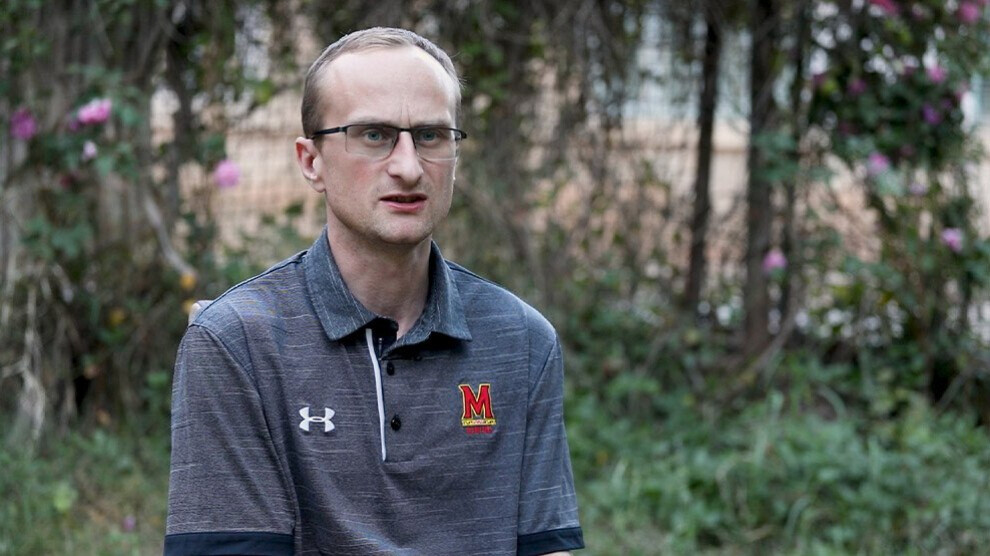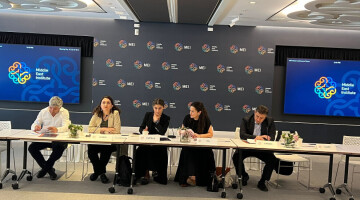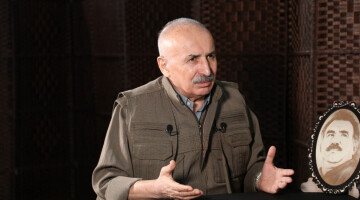Goran Kobanê is an internationalist from Germany and has been living in Rojava for six years. In an interview with ANF, he explains why he went to northern Syria in the summer of 2015 and what motivates him to stay there. He advises all people to come to the self-governing region of northern and eastern Syria to see and learn from the grassroots democratic project and the women's revolution.
"I am originally from Germany and came to Rojava, to Kobanê, about six years ago, in the summer of 2015. The crucial point and motivation was the battle for Kobanê. That was in the media at the time, it was in the press in Germany, in Europe, internationally, and somehow everyone was aware of it. IS was at the height of its power at the time. They had taken so many cities in Syria, in Iraq, and Kobanê was something like the decisive battle. At the time, it was said that if Kobanê fell, ISIS would be well on its way to marching directly to Europe. And that motivated me at the time to come here and see how I could help."
The fight for Kobanê: "It was madness"
The resistance in Kobanê was very impressive for him, says Goran Kobanê and continues: "The friends fought with simple, light weapons against tanks and a superior number of opponents. The courage that the friends had here, that was madness. They went into battle partly expecting to die, but they knew they were falling for a good cause and were willing to make that sacrifice. They knew that if they didn't fight, then all of Kurdistan would be in danger, then Kobanê would be in danger. And who knows how many civilians would have been murdered." Above all, he said, he was impressed that so many internationalists from different parts of the world wanted to resist.
Meanwhile, Germany continued to support the Turkish state, Goran Kobanê said, "And the Turkish state has demonstrably provided logistical support for ISIS. They took care of the wounded, they provided border crossings, and that was obvious to the world. And yet the German state continued to support the Turkish state. There was no military help, which the friends here would have needed to resist.
German society, it must be said, has already taken this on board. They followed it, they sympathized with the Kurds and with the resistance, but someone really stood up and said: I'm taking a risk, I'm taking a risk and maybe I'll come here and help,' that's something very few people have done. That was another motivation for me to say: Now more than ever. I have two healthy hands, I can come here. I am healthy, why not. I have no excuse to say I can't help here."
The defeat of ISIS in Kobanê was like the breaking of a myth: "Until then, ISIS had only won, won, won. They were advancing and it was thought that they could no longer be stopped. And then, thanks to the heroic resistance of the Kurds and their friends, they were defeated and had to retreat. Later, they were pushed back further and further, and that was more or less the beginning of the end for ISIS. And if Kobanê had fallen, who knows how it would have turned out."
"Germany has itself blackmailed by Erdogan"
Even after the ISIS has been defeated territorially, the Turkish state supports and protects Islamist troops, who today would only call themselves something else, the internationalist continues: "In my opinion, this has only one goal: to break the Kurdish resistance, ideally to wipe out all of Kurdistan and to destroy this really successful model of self-government. Germany nevertheless continues to support the Turkish state, even though it's obvious that they're committing human rights violations here, that they're expelling people here, that they're murdering people."
“The German government is allowing itself to be blackmailed by the Erdogan government with the refugees in Turkey. That's over three million. Turkey and Erdogan are constantly threatening to open the borders, and this allows Germany and the EU to be blackmailed. Pressure should be put on them very clearly and they should say: withdraw from Afrin, withdraw from Serêkaniyê, withdraw from the occupied territories, or our economic relations will be broken off. But unfortunately, the German state is not doing that. They don't do anything. They cooperate with Erdogan as if nothing ever happened. German society could do more, it definitely has to do more. People have to go out on the streets, they have to put pressure on the politicians. What are the weapons financed by? They are financed by tax money. The bottom line is that it's everyone's fault that people are dying here because the weapons come from Germany."
Germany supports Turkey primarily for economic reasons, says Goran Kobanê: "Germany makes billions with these arms deliveries. Turkey has bought dozens of tanks to use against northern Syria. Germany is making billions and doesn't want to risk economic relations. The human lives in northeastern Syria do not count and it is accepted that hundreds of people would be killed and entire areas depopulated.
"Take to the streets, put pressure!"
Asked what he expects from people in Germany, the internationalist answers, "Take to the streets. Protest. Put pressure. Here, dozens of people are dying every day, displaced, and this is happening with Germany's guilt. Show the politicians and those responsible what you think about it. It's up to you, it's in your hands."
The German internationalist adds, “There are many internationalists in Rojava who have taken the risk of coming to the region. They are happy here and contribute their share. They can contribute a lot and learn an extreme amount here. They learn about the system of self-government, which is an example of how a democratic, good, equal world can work. How the role of women is promoted here in the Middle East, you don't see that anywhere else. And that's just a wonderful example of how it can be. I can only advise you to come here, check it out, even if it's just for a few months. It's incredible."














